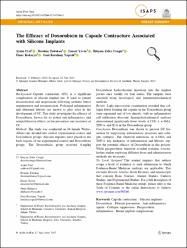| dc.contributor.author | Ural, Aydın | |
| dc.contributor.author | Tabakan, İbrahim | |
| dc.contributor.author | Yavuz, Ensari | |
| dc.contributor.author | Cengiz, İhtişam Zafer | |
| dc.contributor.author | Kokaçya, Ömer | |
| dc.contributor.author | Yaprak, Gazi Kutalmış | |
| dc.date.accessioned | 2025-10-13T11:56:27Z | |
| dc.date.available | 2025-10-13T11:56:27Z | |
| dc.date.issued | 2025 | en_US |
| dc.identifier.citation | Ural, A., Tabakan, İ., Yavuz, E., Cengiz, İ. Z., Kokaçya, Ö., & Yaprak, G. K. (2025). The efficacy of doxorubicin in capsule contracture associated with silicone implants. Aesthetic Plastic Surgery. https://doi.org/10.1007/s00266-025-05166-3 | en_US |
| dc.identifier.issn | 0364-216X | |
| dc.identifier.uri | https://hdl.handle.net/20.500.12900/736 | |
| dc.description.abstract | BackgroundCapsule contracture (CC) is a significant complication of silicone implant use. It leads to patient dissatisfaction and reoperations following aesthetic breast augmentation and reconstruction. Prolonged inflammation and abnormal fibrosis are known to play roles in the development of CC. This study investigates the efficacy of Doxorubicin, known for its potent anti-inflammatory and antiproliferative effects, in the prevention and treatment of CC.MethodsThe study was conducted on 24 female Wistar-Albino rats, divided into control, experimental control, and Doxorubicin groups. Silicone implants were placed in the back regions of the experimental control and Doxorubicin groups. The Doxorubicin group received 4 mg/kg Doxorubicin hydrochloride injections into the implant pocket once weekly for four weeks. The samples were analyzed using histological and immunohistochemical methods.ResultsLight microscopic examination revealed that collagen fibers forming the capsule in the Doxorubicin group were organized and of low density, with no inflammatory cell infiltration observed. Immunohistochemical analyses demonstrated significantly lower levels of COL-1, alpha-SMA, TNF-alpha, and IL-6 in the Doxorubicin group.ConclusionDoxorubicin was shown to prevent CC formation by suppressing inflammatory processes and collagen synthesis. The observed reductions in alpha-SMA and TNF-alpha, key mediators of inflammation and fibrosis, support the potential efficacy of Doxorubicin in this process. While periprosthetic injection avoided systemic toxicity, further studies exploring different doses and administration methods are necessary.No Level AssignedThis journal requires that authors assign a level of evidence to each submission to which Evidence-Based Medicine rankings are applicable. This excludes Review Articles, Book Reviews, and manuscripts that concern Basic Science, Animal Studies, Cadaver Studies, and Experimental Studies. For a full description of these Evidence-Based Medicine ratings, please refer to the Table of Contents or the online Instructions to Authors www.springer.com/00266. | en_US |
| dc.language.iso | eng | en_US |
| dc.publisher | SPRINGER | en_US |
| dc.relation.isversionof | 10.1007/s00266-025-05166-3 | en_US |
| dc.rights | info:eu-repo/semantics/closedAccess | en_US |
| dc.subject | Capsule contracture | en_US |
| dc.subject | Silicone implants | en_US |
| dc.subject | Doxorubicin | en_US |
| dc.subject | Fibrosis prevention | en_US |
| dc.subject | Anti-inflammatory | en_US |
| dc.title | The Efficacy of Doxorubicin in Capsule Contracture Associated with Silicone Implants | en_US |
| dc.type | article | en_US |
| dc.department | İstanbul Atlas Üniversitesi, Tıp Fakültesi, Cerrahi Tıp Bilimleri Bölümü | en_US |
| dc.contributor.institutionauthor | Cengiz, İhtişam Zafer | |
| dc.relation.journal | AESTHETIC PLASTIC SURGERY | en_US |
| dc.relation.publicationcategory | Makale - Uluslararası Hakemli Dergi - Kurum Öğretim Elemanı | en_US |

















